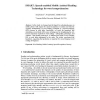Free Online Productivity Tools
i2Speak
i2Symbol
i2OCR
iTex2Img
iWeb2Print
iWeb2Shot
i2Type
iPdf2Split
iPdf2Merge
i2Bopomofo
i2Arabic
i2Style
i2Image
i2PDF
iLatex2Rtf
Sci2ools
110
Voted
AIED
2011
Springer
2011
Springer
SMART: Speech-enabled Mobile Assisted Reading Technology for Word Comprehension
In this study, we designed and developed two educational games on mobile phones with support for speech-recognition to examine and train the cognitive underpinnings of word reading in English as a Second Language (ESL) learners in rural India. Specifically, we tested the hypothesis that articulating a word aloud will be more advantageous for strengthening the sublexical components required for word reading – orthographic, phonologic, and semantic – than silently practicing it. 31 children from grades 4 and 5 learning ESL in rural India participated in the study. The results corroborated the hypothesis, suggesting that production is important for second language word reading development. Keywords. Word Reading, Mobile Learning, Speech Recognition, Literacy
| Added | 24 Aug 2011 |
| Updated | 24 Aug 2011 |
| Type | Journal |
| Year | 2011 |
| Where | AIED |
| Authors | Anuj Kumar, Pooja Reddy, Matthew Kam |
Comments (0)

